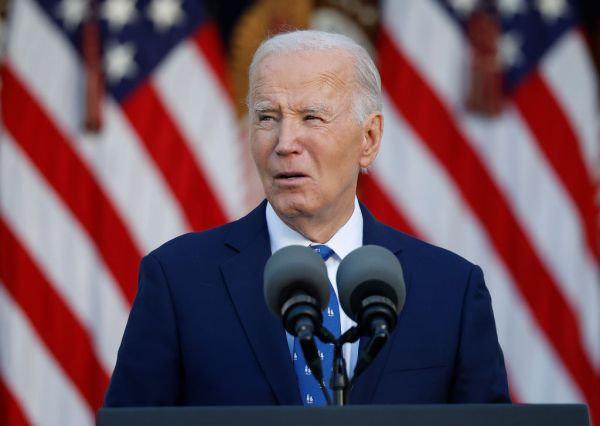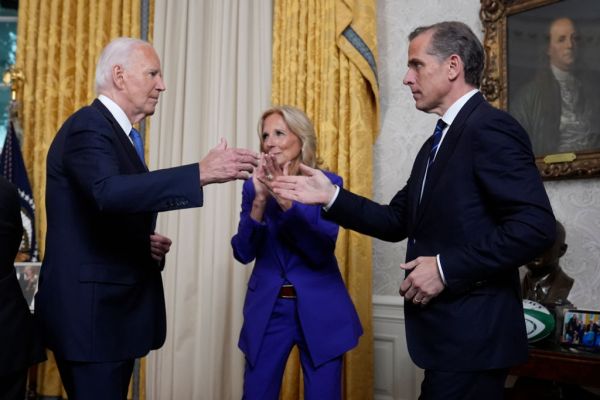One of Donald Trump’s closing campaign arguments was that he would deliver a new “golden age” for America. This week, he announced that this Trump-powered golden age has already begun.
That’s fitting insofar as Trump has rapidly eclipsed the current president, Joe Biden, in setting expectations and even an agenda for America at home and abroad. It feels as if the clock on the second Trump administration has already started.
So has the usual fight over who should get the credit—or blame—for the economy the next president inherits. This happens to some extent with every new president, regardless of party and not just on the subject of the economy.
Ronald Reagan’s vice president, George H.W. Bush, inherited his economy, but Bush’s aides were quick to note that he also inherited an inevitable recession and a savings and loan crisis from the Gipper. In the closing days of this year’s election, Barack Obama complained that Trump had inherited his economic successes in 2017.
Trump has reason to jump the gun on taking credit for the economy now: It’s doing amazingly well.
That’s not to minimize the pain of many Americans or ignore economic problems such as skyrocketing debt, inflation and dislocations in some regions and industries. Even amid a macroeconomic boom, people live in microeconomic circumstances.
The U.S. economy is nevertheless the envy of the world. Don’t take my word for it: The cover of a special issue of The Economist in October described the American economy as just that, the “envy of the world,” noting that the United States “has left other rich countries in the dust.” The Financial Times reached the same conclusion this month.
It’s a stark contrast to the 1990s, when many expected Europe’s economies to leave ours in the dust. In 2008, the European Union’s economy was 10 percent bigger than that of the United States. By 2022, it was 23 percent smaller. The EU grew 21 percent during this period, but the American economy grew 72 percent.
Today the U.S. economy generates about a quarter of global output. U.S. stocks account for 65 percent of global equities, while Japan, China and the United Kingdom combined account for just more than 10 percent. If Britain were an American state, it would barely edge out Mississippi—our poorest state—in per capita gross domestic product.
There are many reasons for this. Americans simply work harder than citizens of other rich countries. Our productivity has outstripped the Eurozone’s more than 3 to 1 since 2008. Our business culture is different, too: We are the most entrepreneurial country in the world, and we regard business failure not as a cause for shame but as useful experience for the next attempt. America is also better at assimilating immigrants than most countries, and the immigrants we tend to attract generally work very hard.
I could go on. The point is that we have had different presidents with very different policies and even more different rhetoric over the last 30 years. But U.S. economic trends—with the usual dips and spikes—have been largely positive through all of their presidencies.
As the Manhattan Institute’s Brian Riedl put it in National Affairs, “the notion that there is a simple partisan pattern to the health of the economy is an extension of the exaggerated politicization of our understanding of contemporary American life.”
Recent dissatisfaction with the economy, spurred by inflation, fueled the idea that America was doing especially awful under Biden. Again, we live in microeconomies, so it’s understandable that many people had that view. But we’ve still been doing better than pretty much everyone else.
Trump’s focus on the economic downside was typical for a presidential challenger and fair enough. But he was wrong to suggest that our competitors were eating our lunch.
None of this is to suggest that presidents and their economic policies don’t matter. It’s just that they don’t matter as much as presidents and their partisans claim they do.







Please note that we at The Dispatch hold ourselves, our work, and our commenters to a higher standard than other places on the internet. We welcome comments that foster genuine debate or discussion—including comments critical of us or our work—but responses that include ad hominem attacks on fellow Dispatch members or are intended to stoke fear and anger may be moderated.
With your membership, you only have the ability to comment on The Morning Dispatch articles. Consider upgrading to join the conversation everywhere.